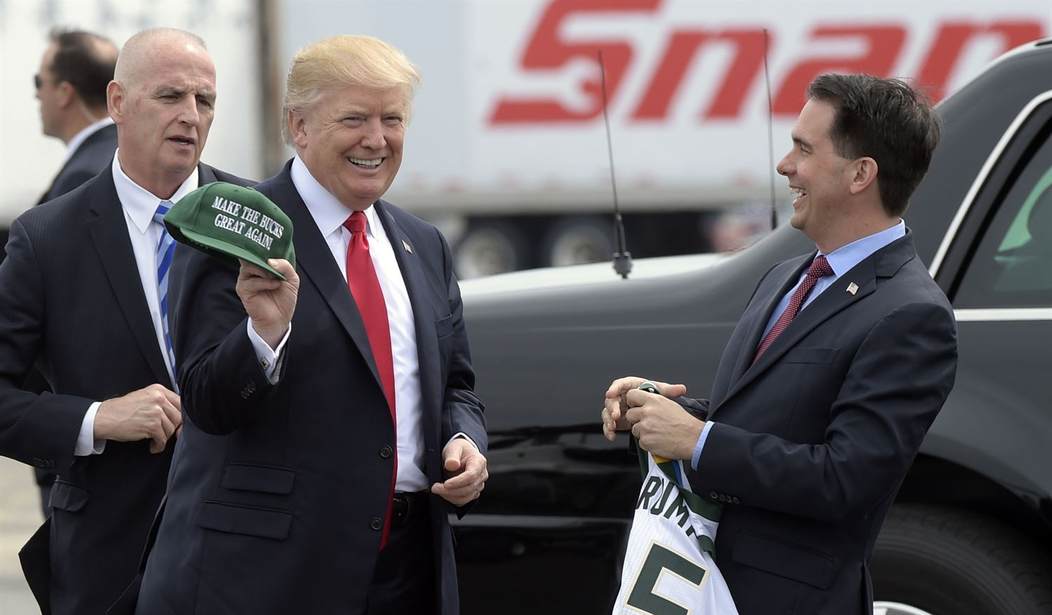How many free-traders does it take to have a trade war? It’s a nonsensical question, but you have to wonder given the actions of our trading partners, especially those in the G-7, who ignored President Trump’s suggestion to eliminate all tariffs, and instead implemented tariffs of their own.
Free-traders understand that tariffs harm both the exporting country and the importing country. Real free-traders also understand that retaliatory tariffs do the same thing — harm both importing and exporting countries. Yet too many of our trading partners, after rightly warning of the harmful economic consequences of tariffs on steel and aluminum, imposed tariffs of their own.
As bad as the retaliatory tariffs may be, much worse was the total silence regarding President Trump’s suggestion to eliminate tariffs altogether.
One of the evergreen justifications offered for tariffs is that they’re a negotiating tool -- that can wrest concessions from other countries and supposedly lead to freer trade all around. In this story, the tariffs are temporary and get removed when the trading partners remove theirs as well.
Unfortunately, this happy ending is so rare, and the resulting tariffs generally so durable, that trade wonks and scholars totally discount the tariffs-are-only-a-strategy claim.
Industries that receive protection from foreign competition don’t really care whether the tariff is or is not a negotiating tool. They’ll still lobby to keep the tariff in force indefinitely.
For example, in response to perceived shortages of wool during the War of 1812, the wool industry received protection from imports, justified by wool’s critical importance for the military. The protection remained in force through the end of the 20th century, long after anybody could make a case for wool being a national security issue.
Recommended
Such cases explain why so many doubt that the steel and aluminum tariffs (along with the billions of dollars of Chinese goods targeted by separate tariffs) are actually a negotiating ploy.
But President Trump did throw out the possibility of zero tariffs. Many discounted the offer as insincere -- and perhaps it was. However, mind-reading is difficult, and pursuing the offer would either lead to zero tariffs or expose any insincerity on the president’s part.
The upside is huge, and the downside is trivial. Given this risk/reward ratio, it is stunning that so few in the policy world are discussing this zero-tariff offer and that virtually none of our trading partners responded.
To be sure, tariffs aren’t the only form of trade restriction. Too often, anti-trade policies masquerade as domestic subsidies and regulations. So Canada’s Prime Minister Justin Trudeau raised a reasonable point in asking if subsidies could be included as well.
Divining the trade impacts of domestic policies is often contentious and unclear. Actual tariffs, on the other hand, are spelled out in black and white.
Further, zero is a unique, easy-to-recognize number. Though nothing in trade negotiations is actually simple, mutually zeroing out tariffs is as close to simple as trade deals could get. A world with non-tariff trade restrictions in place, but no tariffs, is better than a world with both tariffs and non-tariff restrictions.
Encouraging the zero-tariff option doesn’t require us to back-stop criticism of the various new and harmful tariffs implemented and proposed by the Trump administration. But it does require us to at least say, “Hey, that’s not a bad idea.”
The world leaders say they are free-traders. This is a good opportunity to call any bluffs.
If our G-7 partners want to end the steel and aluminum tariffs and really want freer trade, zero is a good place to start.
There is no shame in doing the simpler and easier the part first. Even if the trade deal went no further than zero tariffs, it would be a big improvement. If it turns out that our leaders don’t even want to do the easy part, they will have been exposed as protectionists, and not really free-traders looking for a negotiating strategy.
Either way, we won’t be any worse off. And we may be much better.
























Join the conversation as a VIP Member